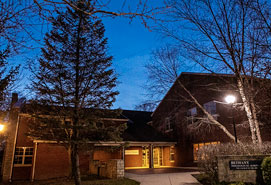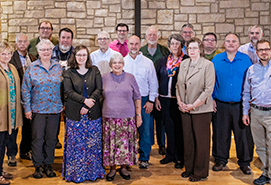 Shortly after Anna Mary Forney married Curtis Dubble, she said to him one day, “Curtis, don’t you think we ought to be tithing?” Taken aback, Curtis mumbled a bit and responded, “Uhhh, I don’t remember hearing that kind of promise in our wedding vows.”
Shortly after Anna Mary Forney married Curtis Dubble, she said to him one day, “Curtis, don’t you think we ought to be tithing?” Taken aback, Curtis mumbled a bit and responded, “Uhhh, I don’t remember hearing that kind of promise in our wedding vows.”
In Curtis’ early family upbringing, you gave to the church when you had to—when the gas bill needed to be paid, when the roof of the church needed fixing, or other such needy enterprises. The concept of stewardship or a tithe was basically foreign to his thinking. Thus, that innocent question from the one who would become his spouse of six decades triggered a journey into a new way of thinking. In the years that followed, the Dubble family systematically committed a percentage of their income to God’s work. Anna Mary, the inspiration, was taken from this life four years ago, but in his retirement Curtis continues to commit 30% of his annual income to the work of the church and its related missions, including Bethany Seminary.
We had to cajole Curtis a bit to let us print this story. Stewardship has become an inseparable part of his gentle and unassuming ministry and witness, not necessarily something he wishes to publicize. Nonetheless, it is a part of who he has become, through all his years as a pastor, as a General Board Chair, as an Annual Conference Moderator.
Curtis’ journey is reflected in a story told of Bill Diehl, author of The Monday Connection and other books on the intersection of faith and daily life. As a well- compensated manager at Bethlehem Steel, he was overwhelmed when someone suggested he might tithe. He agreed to “just start small”, at 2%. He and his family did, then moved to 5%, then 10%, then made it a percentage of gross income rather than take home income, and then on upward from 10%. And so the tithing mindset grew.
The true tithe grows out of a realization of a wish to give from one’s abundance, not out of a crisis need to fix things. For most people it is something that arises not out of compulsion but something that grows on them as they mature in their understanding of faith and their relationship to their resources. For Curtis it has been a lifelong journey. Where are we on that journey?







 Shortly after Anna Mary Forney married Curtis Dubble, she said to him one day, “Curtis, don’t you think we ought to be tithing?” Taken aback, Curtis mumbled a bit and responded, “Uhhh, I don’t remember hearing that kind of promise in our wedding vows.”
Shortly after Anna Mary Forney married Curtis Dubble, she said to him one day, “Curtis, don’t you think we ought to be tithing?” Taken aback, Curtis mumbled a bit and responded, “Uhhh, I don’t remember hearing that kind of promise in our wedding vows.”
 Green Circle: Bethany invests in 100% renewable energy.
Green Circle: Bethany invests in 100% renewable energy.